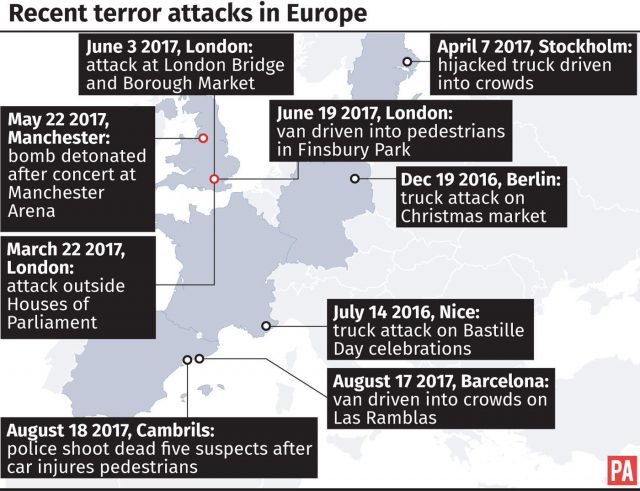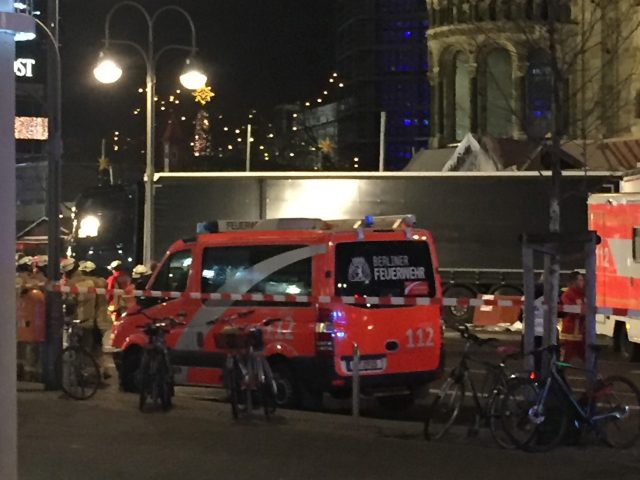
Motorists should be subject to identity checks when hiring vehicles as part of measures to tackle the use of lorries and vans in attacks, a former terror laws watchdog has said.
Lord Carlile of Berriew called for a number of steps after Barcelona became the latest European city hit by the terrorist tactic.
The peer, who was independent reviewer of terrorism legislation from 2001 to 2011, warned it is “all too easy for terrorist events using vehicles to occur”.
He told the Press Association: “Vehicle hire contracts should be subject to identification checks, and hire company industry bodies should be subject to a code of practice to protect against vehicle hire to criminals of all kinds, to be negotiated and agreed with Government within a very short period of time.”
Under the proposed regime, hire firms would be required to carry out “standard checks” and report any concerns or anomalies, he said.
Lord Carlile also recommended that local planning authorities should be obliged to ensure that appropriate barriers exist to protect pedestrianised areas.
 Lord Carlile of Berriew says it has become it is “all too easy for terrorist events using vehicles to occur” (Paco Anselmi/PA)
Lord Carlile of Berriew says it has become it is “all too easy for terrorist events using vehicles to occur” (Paco Anselmi/PA)
He said: “Counter-terrorism protection should be a requirement of all planning consents in public spaces where the population foreseeably will congregate. This is primarily a matter for local councils.”
Asked whether there needed to be changes to laws on last-minute lorry and van hire, Prime Minister Theresa May said: “We must look carefully, of course, at the powers that our police and agencies need to be able to deal with terrorism.”
Labour leader Jeremy Corbyn described a requirement to show ID and “show what you are using the vehicle for” as “fair enough”.
 Recent terror attacks in Europe (PA graphic)
Recent terror attacks in Europe (PA graphic)
He added: “Obviously you don’t want to to make it impossible to hire a van at short notice, which clearly people need to be able to go about their normal daily business.”
The potential for large vehicles to inflict mass casualties was laid bare in horrifying fashion in July last year when a lorry drove through crowds gathered to celebrate Bastille Day in Nice, killing 86 people and injuring scores of others.
In December 2016, an attacker drove a lorry into a crowded Christmas market in central Berlin, killing 12 people.
 Twelve people were killed in the centre of Berlin at Christmas by a man driving a lorry (Claire Hayhurst/PA)
Twelve people were killed in the centre of Berlin at Christmas by a man driving a lorry (Claire Hayhurst/PA)
This year in the UK, vehicles have been at the centre of attacks on Westminster, London Bridge and Finsbury Park.
The incidents sparked suggestions van rental could be subject to more stringent checks, while officers appealed for vehicle hire and haulage firms with suspicions about rental attempts to come forward.
UK authorities have also been looking closely at physical security measures.
Earlier this year, police announced plans to step up the use of the national barrier asset, a collection of temporary equipment including security fences and gates, to protect crowded events.
Scotland Yard reviewed the security of 33 bridges around the capital and a number were fitted with barriers designed for “hostile vehicle mitigation”.


Comments & Moderation
Readers’ comments: You are personally liable for the content of any comments you upload to this website, so please act responsibly. We do not pre-moderate or monitor readers’ comments appearing on our websites, but we do post-moderate in response to complaints we receive or otherwise when a potential problem comes to our attention. You can make a complaint by using the ‘report this post’ link . We may then apply our discretion under the user terms to amend or delete comments.
Post moderation is undertaken full-time 9am-6pm on weekdays, and on a part-time basis outwith those hours.
Read the rules here